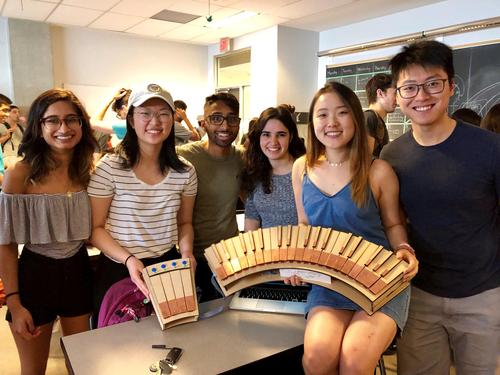A class of systems design engineering students has proven that just about anyone can play a musical instrument, even individuals with complete hearing loss. Students in Matt Borland’s SYDE 361 course gave an end-of-term concert demonstrating what they designed over the past three months for people with various disabilities.
By combining hands-on engineering skills and creativity, 16 teams came up with everything from a wearable tech vest that allows people with hearing loss to enjoy music through both sight and vibrations, to a synthesizer for the blind and an accessible xylophone for people with stage 2 rheumatoid arthritis.

Members of the Astratta team from left: Tanya Ralliaram, Annie Zhang, Neil Agarwal, Rachelyn Collins, Charmaine Wang and Eason Gao.
This is an excerpt of a story originally published on the Faculty of Engineering news site.
Team Toto built an instrument for people with Duchenne muscular dystrophy that is caused by a genetic defect and leads to muscle weakness and loss of muscle mass. The students produced a keyboard that requires less force to play in a much smaller range of motion. The keys are backed with Velcro so they can be easily repositioned in a way that is ergonomically best for the individual.
A modified piano for stroke survivors was created by team Astratta.“When people suffer strokes usually half their body ends up with less dexterity,” said member Rachelyn Collins. “So we created a piano on which they can play with one hand while playing pre-recorded chords that before a stroke could have been played with the other.”
Borland, a systems design engineering lecturer, said working closely with individuals with various accessibility issues was meaningful for his students.
“We were very lucky to have the support of the Waterloo Experiential Learning Institute that provided us with funding so we could pay for participants to come in,” said Borland. “It was great exposure for our students and provided a lot of growth for them both as designers and as people.